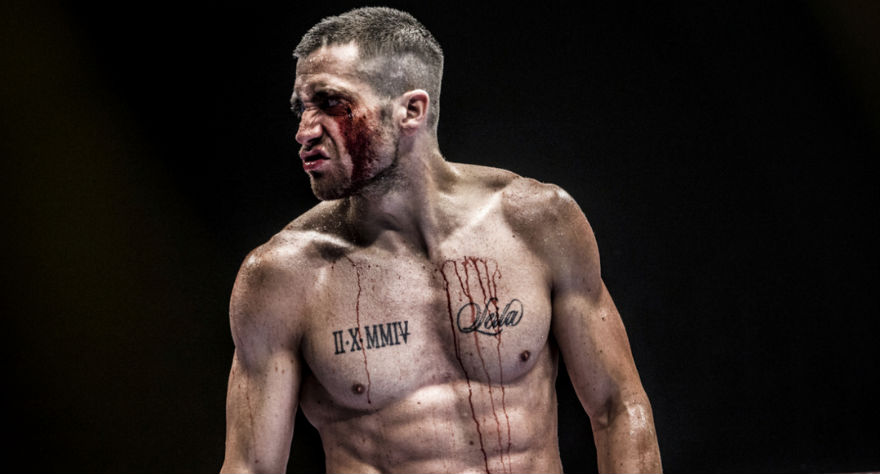
An ironically-titled, store-brand boxing drama.

An ironically-titled, store-brand boxing drama.
The best boxing matches are roller coasters of emotion, full of twists, shifts in momentum and ungodly displays of skill. Unlike a classic big-time fight, Southpaw, starring Jake Gyllenhaal as a short-fuse champion prizefighter who falls from the top of the mountain and crawls his way back up, offers no such surprises or knockout performances. Its title, which refers to the unconventional left-handed boxing stance, couldn’t be more ironic considering how conventional and easy-to-read this movie is.
Cliché is king in director Antoine Fuqua‘s store-brand boxing drama, and a valiant tough-guy transformation by Gyllenhaal just isn’t enough to keep things interesting. Scrunching his perpetually swollen face, flexing his bulging muscles in fits of rage and slurring his words in hopes of garnering punch-drunk sympathy, Gyllenhaal gives “his everything” as Billy “The Great” Hope, the movie’s meathead hero. Billy fights with a death wish, dropping his hands and welcoming his opponents’ haymakers with reckless abandon; unlike most boxing movie underdogs, however, Billy’s got everything to lose.
We meet Billy at the top of his game, on a 43-fight win streak as the light-heavyweight champ of the world. He’s got a nurturing wife, Maureen (Rachel McAdams), who grew up with him in the same Hell’s Kitchen orphanage; she’s been there from the jump, and he worships her for it. She organizes every aspect of his life so that he can concentrate on bludgeoning his heavy-handed dance partners. Their precocious daughter, Leila (Oona Laurence), wants nothing more than to watch her dad in the ring, though the thought is too much for Maureen to stomach. As Billy spits up blood after his fights, Maureen sends Leila two-word texts: “Daddy won.”
In a tragic turn of events that has a snowflake’s chance in hell of surprising anyone, a heated scuffle at a charity event between Billy and smack-talking rival Miguel Escobar (Miguel Gomez) gets out of hand: shots ring out in the hotel lobby, and the scene ends with Billy cradling his dying wife in his arms. This sends him on the obligatory downward spiral of suicidal, drunken rage; he loses his money, house, cars, friends, more than a little bit of his sanity, and most regrettably, Leila, who’s taken away by child services. His Don King-like manager/promoter (50 Cent) offers moral support, though even he turns on Billy when he decides to jump ship and manage Escobar instead.
Floundering in abject poverty, Billy seeks the tutelage of old-timer Tick Wills (Forest Whitaker), the former coach of the only man to ever beat Billy in the ring (in Billy’s mind, not the split-decision scorecards). Wills “doesn’t train pro fighters anymore,” instead dedicating himself to mentoring troubled youths and teaching them discipline through via the “sweet science.” But who are we kidding? Wills, of course, eventually changes his mind and trains Billy to fight Escobar for the world title in the film’s final, epic(ish) battle.
Fuqua cakes on grimy imagery of in-ring brutality and low-lit interiors to reflect the darkness inside Billy’s soul (or something faux-poetic like that), but none of it yields any dramatic dividends; the movie just looks gross. With the fight scenes, the filmmakers try to mimic modern televised boxing presentations while throwing in quick cuts of jabs, hooks and body shots seemingly at random. Basically, the fights look like every other fight in every other forgettable boxing movie. First-person shots from both Billy and Escobar’s perspectives are butt-ugly and laughably distracting.
Gyllenhaal is a better storyteller with his facial expressions and body language than screenwriter Kurt Sutter is with his uninspired dialogue. As Billy learns to be a smarter, calmer fighter both inside and outside the ring, Gyllenhaal’s mannerisms reflect his newfound ability to not lose his shit at the tiniest aggravation. It’s a slow-burn character arc, and he conveys each stage of maturation with careful articulation. He’s the only thing in the movie that whiffs of any passion.
Southpaw is nothing more than a loosely-stitched patchwork of ideas ripped straight out of every boxing movie ever. It always feels like we’re five steps ahead of the story, and that’s because we’ve seen this stuff a million times before. The movie was originally designed as a showcase film for Eminem (heaven knows what kind of disaster that would have been), and though it’s far from a success, Gyllenhaal (barely) keeps Southpaw from staying down for the count.